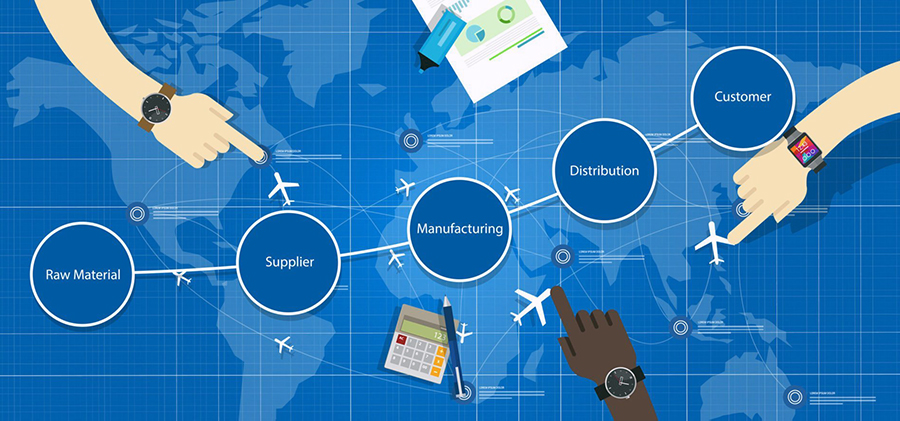Supply Chain Management Gets a Hand Up
Machine learning is taking the helm when it comes to international logistics and supply chain management. Based on a variety of executives from the transport market, these fields expect to go through a more significant transformation. The on-going development in the areas of technologies like machine learning, artificial intelligence, and comparable brand-new technologies is said to have the prospective to generate disruption and lead development within these industries.
Artificial intelligence includes calculating methods that help to pick significant amounts of information that we can gather from logistics and supply chain. You can put such techniques to utilize, and they can be analyzed to get outcomes that can initiate processes and intricate functions.
Numerous organizations have now won with financial investments in machine learning. As per Adobe, currently, 15% have started to utilize AI while other 31% plans to have them implemented in 2019. A few of the areas from which income can build are research and development, item development, supply chain operations, and customer service.
Effect of Machine Learning in Logistics
Predictive Abilities Will Increase
The performances of the business in the locations of network preparation and predictive need are getting enhanced with AI abilities. Organizations get to end up being more proactive by having a tool that can help with capability development and precise forecasting. When they know what the marketplace expects, they can quickly move the vehicles to the locations with more demand and consequently bring down the functional costs.
To avoid risks, prepare for occasions and develop options, now techs are using data. The data helps companies to use their resources in the right way for optimum benefits, and machine learning helps them with it more accurately and much faster way.
Robotics
You can not speak about machine learning without discussing robotics. Although many consider robotics to be a futuristic and innovative idea, the supply chain currently uses it. Robotics are used to track, find, and move stock within the storage facilities. Such robots featured deep knowing algorithms that help the robots make free choices regarding the various processes the storage facility performs.
Big Data
Apart from robotics, artificial intelligence is also about big data. For logistics companies, Big Data mainly helps to optimize future performance and predict accurate outlooks better than ever. When the insights of Big Data are utilized together with artificial intelligence, it assists in enhancing different locations of the supply chain like supply chain transparency and path optimization.
For AI in the logistics industry, creating clean information is a big step, and they can not implement without having such functional figures. It is not easy to measure efficiency as information comes from various sources. At the source level, it is not possible to enhance such data, so algorithms the analyze information, improve the quality of data, recognize problems to obtain transparency, which can create service advantages.
Computer Vision
When you are moving freight throughout the world, it is always great to have a set of eyes to keep track of, and it can be best when it comes to cutting edge innovation. Now you can see things in a new way by utilizing computer system vision, which is essentially machine learning for the logistics.
Autonomous Vehicles
Self-governing automobiles are the next big thing that machine learning uses the supply chain. Having driverless trucks can take a while, but the logistics market is now making use of modern driving to increase effectiveness and safety. The considerable modification in this market is in terms of assisted braking, lane-assist, and highway auto-pilots.
Better-driving systems are coming up to achieve lower fuel consumption, which involves combining numerous trucks to have developments. Computer systems control such developments, and they are connected too. Such a configuration is said to assist the trucks in saving fuel first and foremost.

Impact of Machine Learning (AI) in Supply Chain Management
AI Uses Contextual Intelligence
AI supplies the supply chain with contextual intelligence, which can be utilized by them to reduce the operating expense and handle stock. The contextual information helps them to get back to the clients rapidly.
Businesses utilize AI in addition to machine learning to get brand-new insights into various locations, which include warehouse management, logistics, and supply chain management. Some of the innovations used in these areas are AI-powered Visual Evaluation to determine damage and perform required correction by taking photos of the freight by utilizing special cams and smart robotic arranging to arrange palletized shipments, parcels and letters.
AI Provides Insights to Enhance Productivity
By using AI in supply chain management, it is possible to examine its performance and develop brand-new elements that impact the same location. To discover the aspects and issues which affect the performance of the supply chain, AI combines the capabilities of different technologies like support learning, not being watched learning, and monitored learning.
AI Helps With Demand Forecasting by Examining Large Volumes of Data
AI makes it possible to measure and track all the aspects which can work towards using accuracy in demand forecasting. Based on the weather, real-time sales, and other elements, it offers constant forecasts in a loop. Such types of details can aid with automated sorting, improving warehouse management, self-management of stock systems, and self-driving forklifts.
AI Can Help With Enhancing the Selection of the Supplier and Its Efficiency
AI can analyze the data related to the supplier like audits, in-full delivery efficiency, credit report, examinations, and based upon that provide info that can help to make future decisions. This sort of step helps the company make better choices as a supplier and work towards improving customer support.
AI Helps to Enhance the Consumer Experience
As per Pega, 38 percent of customers believe that AI can improve customer support. AI personalizes the relationship of customers with logistics service providers. Customers can now use voice-based service to track their shipment. In case any issues come up when the client is redirected to the customer help team.
AI Improves Factory Scheduling and Production Planning
With the introduction of AI now business can deal with boosting factory scheduling and production planning. They can work to examine the different problems and then enhance them. With AI having the power to stabilize constraints, this can work well for build-to-order situations automatically.
Impact of Artificial Intelligence in Transportation
Concerns in transport occur when system behavior is difficult to form based upon the foreseeable pattern, which is affected by human errors, traffic, or incidents. In such scenarios, AI can concern your rescue. AI forecasts decisions based on data analysis. AI is now done in several methods throughout the transportation market, including:
Corporate Decision Making
By utilizing AI techniques, the freight transport system can use prediction techniques to know about their volume to simplify planning for the transportation business. Additionally, it is possible to develop a variety of decision-making tools that can be run by AI. Such kind of investments in AI will help the business in the future in a much better way.
Enhancement in Public Security
By real-time tracking of criminal activity information in the city areas, it has ended up being possible to ensure the safety of the people who are utilizing public transportation. Such data can be used by the authorities to make their patrolling efforts efficient and work towards ensuring the security of individuals.
Self-Governing Automobiles
Over the years, self-driven vehicles and trucks have been a thing of interest for people. To enhance productivity and decrease the instances of accidents over highways, Elon Musk and Uber have developed self-driving trucks.
Security of Pedestrians
It is possible to reduce injuries and traffic incidents by predicting the course of bicyclists and pedestrians. Gaging traffic info allows for decreasing overall emissions and numerous transportation usage.
Traffic Patterns
The traffic circulation is said to affect transportation substantially. When the data connected to traffic is made useful for traffic management by making use of AI, then such info can be utilized to considerably reduce the congestion in traffic as well as improve it. Today a variety of AI-based services are being used to build smarter traffic solutions, and they are said to play their roles successfully.
AI and Logistics in Summary
With current breakthroughs in innovations like big data and artificial intelligence algorithms, in the future, AI is stated to come up with exceptional services in the supply chain, logistics, and transport industries.

